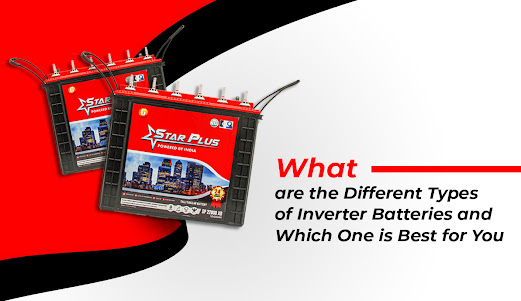A tubular battery is a kind of lead-acid battery commonly used as a backup power source for home inverters and UPS systems. The batteries use a series of tubular electrodes made of lead alloy, surrounded by an electrolyte solution of sulfuric acid. The electrodes resemble a tubular shape, which increases the surface area of the electrode, allowing for more efficient charging and discharging of the battery. Tubular batteries feature long life, durability, and high efficiency in providing backup power.
Tubular batteries store energy using a chemical reaction between lead and sulfuric acid, converting electrical energy into chemical energy during charging and then back into electrical power during discharging. Star Plus Tubular Batteries feature prominent characteristics and supply users with the best quality tubular batteries in Nigeria.
Features of Tubular Batteries
Tubular batteries are essential in providing backup power to homes, businesses, and industries in Nigeria. Some of the crucial roles of tubular batteries include:
1.
Backup
Power: Tubular batteries are in wide use in inverters to provide backup power
during power outages or disruptions. The design provides reliable and
consistent power for extended periods, making them ideal for critical sectors
like hospitals, data centers, and telecommunications.
2. Renewable Energy Storage: Tubular batteries store energy from renewable power sources, including solar panels or wind turbines. They offer a reliable and cost-effective way to keep excess power during periods of low demand and discharge it during periods of high demand.
3. Industrial Applications: Tubular batteries are important in various industrial applications, including material handling equipment, electric vehicles, and backup power for critical machinery. They offer high reliability, long life, and low maintenance, making them a cost-effective solution for many industrial applications.
4. Home and Office Use: Tubular inverter batteries are in wide use in homes and offices to provide backup power for lighting, computers, and other essential equipment. They also contribute to remote locations where grid power is unavailable, providing reliable and consistent power for extended periods.
How does A Tubular Battery Store Energy
Tubular batteries store energy using a chemical reaction between lead and sulfuric acid. The battery consists of a series of tubular electrodes made of lead alloy and surrounded by an electrolyte solution of sulfuric acid. The electrodes have a tubular shape, which increases the surface area of the electrode, allowing for more efficient charging and discharging of the battery.
When the battery takes charge, the electrical energy converts into chemical energy that the battery cells store. The charging process causes a chemical reaction that converts lead oxide and lead dioxide on the electrodes into lead sulfate, releasing oxygen and hydrogen gasses. The sulfuric acid in the electrolyte solution depletes during this process.
When the battery loses charge, the chemical energy stored in the cells becomes electrical. This process reverses the chemical reaction during charging, causing the lead sulfate on the electrodes to convert into lead oxide and lead dioxide. This releases the stored chemical energy in the form of electrical power.
The design of the tubular batteries provides a high depth of discharge, which means they can discharge a high percentage of their total capacity without damaging the battery. It allows them to offer a reliable and consistent backup power source over an extended period.
Benefits of Tubular Batteries
Tubular batteries offer several benefits over other types of batteries, making them a popular choice for backup power applications. Some of the critical benefits of tubular batteries include the following:
Long Lifespan: Tubular batteries last longer than other types of batteries, with a lifespan of up to 7-10 years. The long span makes them a cost-effective option over the long term.
High Efficiency: Tubular batteries such as m power tubular batteries have a high charge acceptance rate and a low self-discharge rate, making them highly efficient in storing and delivering energy.
Low Maintenance: Tubular batteries require minimal maintenance, with no need for water topping or acid refilling. This reduces the total cost of ownership and increases the battery's convenience.
Reliable Performance: Tubular batteries can operate in harsh conditions, including high temperatures and frequent cycling, without losing capacity or efficiency. It ensures reliable performance even during extended power outages.
Wide Range of Applications: Tubular batteries serve many applications, including homes, offices, industries, and remote locations. They are suitable for backup power, renewable energy storage, and industrial applications.
Altogether, tubular batteries offer a reliable, efficient, cost-effective backup power and energy storage solution. Their long life, high efficiency, low maintenance, and wide range of applications make them popular with many households and businesses.
Final Takeaways
The design of the tubular battery makes it highly resistant to corrosion and able to withstand deep discharging, making it a popular choice for applications that require long backup times and frequent cycling. Tubular batteries from Star Plus Batteries are reliable and efficient for providing backup power in various settings, including homes, offices, and industrial use.

.jpg)



